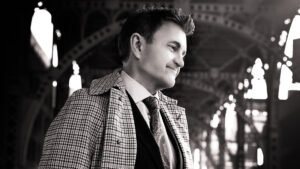
In June, cabaret and recording artist Jeff Harnar released a deeply personal album entitled I Know Things Now: My Life in Sondheim’s Words. He took over 25 of Stephen Sondheim‘s songs to create an episodic, but personal, look at his own life. In the process he takes songs out of their original context in the shows and fashions a way to reveal the ups and downs of his personal life as a gay man.
Harnar was not always open about his sexuality. Nor was he necessarily confident he could sing Sondheim’s music. It took the encouragement of fellow singer KT Sullivan for Harnar to embrace the challenges of the music and be able to sing songs on an album and in a cabaret show in which he declares his love for another man.
The album is available from PS Classics. Harnar is also doing a series of shows: two at the Laurie Beechman Theatre in New York (September 18th and 25th) and one at Middle C Jazz in Charlotte, NC on September 20th.
Last week I spoke with Harnar about Sondheim, his personal story and the satisfaction that has come from being alive, being gay and celebrating it all through Sondheim’s words and music. What follows are excerpts from our conversation that have been edited for length and clarity. You can see the full interview on our YouTube channel.
Do you remember the first time you ever heard any Stephen Sondheim song, what it was and how you heard it?
What a great question. Well, I’m going to narrow the question down to Sondheim, both music and lyrics. Liz Callaway and Ann Callaway – we were in high school together – their parents took them to see Company in New York. Liz had us all sit down and listen to the album. And I thought, what angry people. What caustic, angry people. It was unlike any kind of musical theater I had ever heard. I was intrigued and dazzled and humbled and intimidated.
I pretty much stayed in that bucket until I was 51. It was the first time I really had the courage to venture into actually performing his music. I’ve always been intrigued and dazzled and humbled by the original cast recordings of his shows. I always feel like they belong to those singers. They belong in that world. And that was the first time I ever performed as an openly gay man onstage through the courage and ammunition that his lyrics gave me.
You might have been late to performing the songs, but had you always heard something in the songs that was maybe other than what other people were hearing?
Yes. I had never heard human emotion. I couldn’t express it that way in high school. I had just never heard anything quite like that. Dazzled by it really is the word.
The first show I saw was Sweeney Todd and that 1979 production was all the bells and whistles. I grew up loving horror films. Back then it was not A Star Is Born [he has an original poster from the 1954 version with Judy Garland in his home] on my wall. It would have been Boris Karloff or Bela Lugosi. But that combination of a horror story with his writing and then that physical production with Angela Lansbury and Len Cariou, that was my first Sondheim Broadway experience.
The interesting thing about Sondheim, which I find your recording completely upends in a beautiful way, is that he was very careful to write songs that were so closely intertwined with the book of the musical and specific to the characters that he was writing for. What was the process of building the structure to come up with something that was autobiographical for you so that you could express your life through Stephen Sondheim’s words and music?
As a performer in nightclubs or cabaret, whatever you want to call that, I am the narrator when I’m up there. Whatever I’m singing it is my story that I’m telling. So I always begin with lyrics. Sondheim’s lyrics, I just started combing through them for where do I find my story. I found it quite a bit and in quite a few songs. And they do live interestingly outside of the context. What we’re saying is really to try and express them in a way perhaps radically differently to how they were used in the context of a show, but authentically to my life.
Near the end of your album, and I’m not trying to do a psychological profile of you here, but what goes on in your life that The Ballad of Sweeney Todd is part of your perspective of that life that you wanted to share on this album with that song?
I have dealt with a major eating disorder, a major alcohol problem, and ultimately a major drug addiction that finally got me to the help I needed to get. So that’s the sad part. But the good part is though I couldn’t figure it out at first, I’m really grateful to have figured it out at last. But what precipitated that getting sober was a particularly thick kind of nightmare. And it was wrapped around a relationship. That song allows me to give voice to the rage.
Did you find you had to make any real substantive changes to any of the songs beyond pronouns?
The primary change that we’ve made – and we lived in terror when Sondheim came to see the show because he’s so specific about the voicings and harmonies of his songs – was that we were probably doing something that he would find not to his liking. I anticipated that he would think it was too disrespectful, perhaps to how he intended the songs to be.
He literally came to my second or third time ever performing his music. There he was. I just could hardly inhale oxygen. I am not kidding. He was very gracious about what he saw that night and very gracious to remain kind of an email pal right up to the end of his life and in communication about this album and the show. But the first thing he said to Jon Weber, my music arranger, was, I love the changes and I wish there were more.
How does this album and your show resonate with you in the months since Sondheim passed away?
I’m wildly disappointed, selfishly, that he didn’t live 16 days longer because I was checking in to let him know that my show was coming. The next night was my show and I was still holding the ticket [for him]. He wrote back and said, “I just sprained my ankle and I’m not optimistic.” But thank you for doing the show was the last word. So yeah, there’ll always be that wish that he had come.
I want to ask you about something he said in a 2017 interview that he gave The New York Times Style Magazine in an interview Lin-Manuel Miranda did with him. And he said, “You’ve got to work on something dangerous. You have to work on something that makes you uncertain. Something that makes you doubt yourself.” How did your album, I Know Things Now, check off all those boxes for you and what have you learned in the process of creating, performing and recording it?

I’m blown away by that. That’s exactly what this project is. It’s the courage that it took on the level of just singing his material and trying to feel worthy as a vocalist to the point of view I was taking with this material and the self exposure for me. I have never stood in front of an audience before and sung about loving another man.
The embrace that I’ve gotten everywhere that I’ve gone so far with this show has been extraordinary. And the exhilaration that I get for being this particularly authentic is unlike any other performing experience I’ve ever had. It’s not that I’ve ever denied my sexuality. I just have been crafty about choosing my songs up until now. So it ticks off all those boxes and I hope it’s interesting because it’s received a level of notice, I think, for the very reasons he just said.
To see my complete interview with Jeff Harnar, please go here.
All photos of Jeff Harnar courtesy of PS Classics










